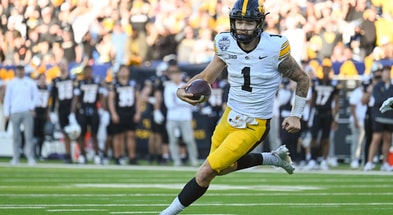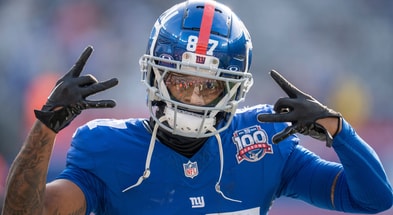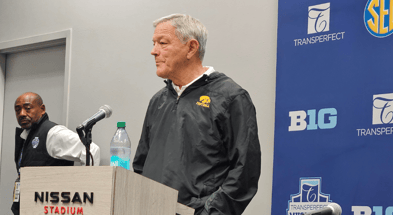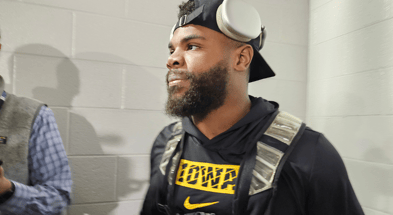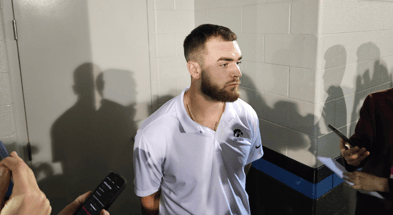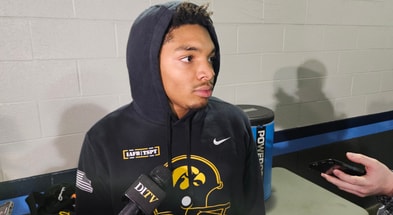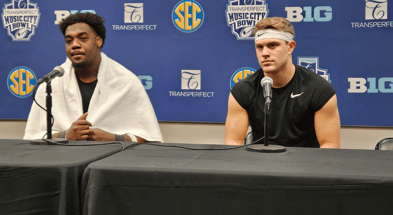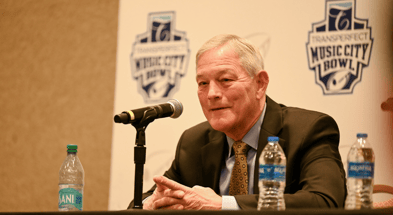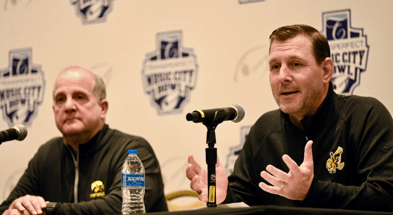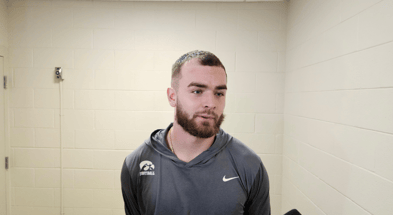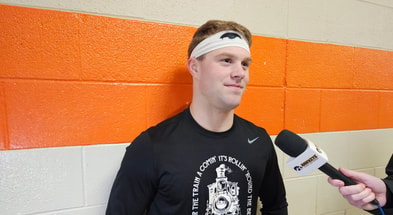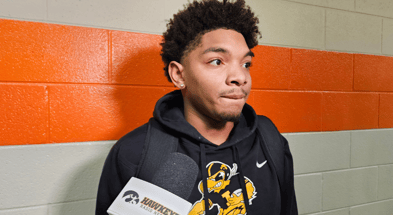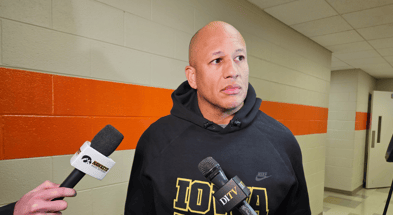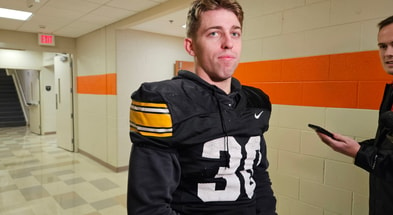Interim Iowa AD meets the media

One year ago at this time, Beth Goetz was still leading the athletic programs at Ball State. She arrived at Iowa last fall to learn the ropes as the Deputy Athletic Director and now, as of August 2nd, she has risen to become the interim Athletic Director for the Hawkeyes.
For the first time since she took over this position, Goetz met with the media and discussed her relationship with the Iowa Swarm NIL group, the Brian Ferentz contract, when decisions might be handed down on the sports gambling investigation, the expanding Big Ten and the impact it has on the budget for the athletic department, and much more.
BETH GOETZ: Good afternoon, everybody. Appreciate you coming out today. I wanted to maybe start with this. In my short time here, I have been incredibly impressed by our student-athletes, our coaches, our staff. We have an amazing fan base and such a generous group of donors.
The combination of their passion, their talents and their character, really, it’s uncommon, and it’s what makes being a Hawkeye so special.
I’m so happy that I have an opportunity to be a part of that here.
I want to thank Gary Barta for the opportunity and the invitation to join the team last fall and for his leadership and his mentorship during that time, certainly what he has done for the Hawkeyes over his tenure and really all of college athletics.
I am thankful to President Wilson for the opportunity to lead over the coming months and to do so alongside this great team here in athletics and across campus.
I could not be more excited. This is going to be a really fun year for our student-athletes and our teams. I know they’re going to have great success, both in the classroom and on the fields of competition, and as always, Hawkeye Nation is going to have a lot to cheer for with these teams.
With that, I’m happy to answer any questions that you might have.
Q. There’s a strategic plan in place currently through 2025. It happened before you arrived. Have you glanced at it? Do you have any thoughts about reshaping it, or are you going to kind of keep it as is into the future?
BETH GOETZ: Yes, I have looked at it. Obviously as a staff we’ve been talking about that since my arrival.
One of the things I really like about it is it’s a vision document, so it’s really broad in nature. In the short term, we’re going to continue to build out some goals that fit with that vision and align with the different pillars, and then long term I think once there’s a new permanent direction, my guess is there will be a closer look at what that strategic plan might look like.
Q. A lot of things happening both at Iowa with gambling investigation and a lot of things happening at the Big Ten level and nationally. What are your top priorities in your first month as interim AD?
BETH GOETZ: That’s why you guys are having a busy summer, just like we are. There’s no shortage of things to focus on.
Really for us, and I think this is always the case, regardless of what might be a hot issue of the day, first and foremost your priority is how do you best support the success of your student-athletes and your teams, and that’s where your focus lives day-to-day, and it’s certainly influenced by some of the things you talked about, whether that’s name, image and likeness or gambling or conference realignment, all the things I’m sure we’re going to get to talk about here, but that’s really where we want to spend our time.
There’s plenty of short-term goals that I think over the next six months both for me and our staff that we want to continue to work through, from fundraising to making sure we manage our financial resources to being prepared strategically to navigate some of the changes in those external spaces, just to name a few.
We’ve got some great facility projects to both conclude and some we’re excited to start. A handful of different topics that we’ll continue to pay attention to, but there’s always going to be new things that are going to attract our attention, but as long as we approach those in a way that the focus remains on providing a great experience and making sure we’re building championship programs across all of our sports, that’s where we’re going to spend our time.
Q. I wanted to ask you about the gambling investigation. Do you have any idea when the student-athletes are going to find out what their suspensions might be? Where are you at in that process?
BETH GOETZ: On the reinstatement process specifically, we have submitted all the requested information to date to the NCAA, and we’re optimistic that we are just hopefully days away perhaps from getting some feedback at least initially on what that means for our student-athletes who currently are here and have remaining eligibility.
There’s obviously some additional steps in the process once that decision is rendered, but we’re optimistic that that might happen here in short order as opposed to a few weeks down the road.
Q. I understand you’ve talked to Brad about the Swarm. Can you characterize how your discussions went?
BETH GOETZ: Absolutely. Yes, I’ve had an opportunity to sit down with Brad, really enjoyed that conversation. He sent me some notes about some tips on today, too. One was to make sure I talked positively about the Swarm. That would be no problem.
But it has been wonderful to at least start to build a relationship with Brad. I know many on our staff have already had an opportunity to do that, but when it comes to name, image and likeness, it’s a critical, critical piece for our student-athletes and our success competitively, no different than the generosity that’s coming in through NIL gifts and through the Swarm and in other ways. It’s just as important these days as scholarships and facilities and any other needs.
Really what Brad and his team have done is given us a chance to be successful, and the way that they did it if you look across the country, many of the other collectives didn’t quite have the same success right out of the gate, and I think they’ve been very thoughtful there. His team is almost in daily conversations sometimes with ours and has been, but we’re appreciative of his efforts, of all of those who have chosen to contribute there, and they’re doing some exciting and fun things.
Q. I think one of their frustrations is there wasn’t a lot of give-and-take with athletics. Do you feel empowered in your role as interim AD to make some change in that area?
BETH GOETZ: Yeah, I think from the beginning it’s been a challenge for all campuses to try and find the right balance between what the NCAA rule structure is or lack of rules in this space might be and where we’re comfortable operating.
I know there has been conversations again with his team and going back to the beginning, but that the narrative around that, some of the movement that we’re starting to see nationally, whether that be through some federal or state legislation or through potentially some more parameters from the NCAA just gives us the ability to be a little bit more flexible.
My thought is that we want to be great partners with Brad, with the Swarm, and really with anyone that’s really to help and support our student-athletes, so we’re looking forward to seeing that continue.
Q. Getting back to the gambling, is there going to be kind of an expansion of the education of the student-athletes? Do you look at this as a cautionary tale for them to do more, to have more of an education?
BETH GOETZ: I think anytime where you see something like this, it’s always a time you want to evaluate and see what practices you have in place and see how you can get better.
Gambling is a couple things. One, I do think we had educational components in place, but the world has changed. The environment that those young men and all of us and women are living in, being bombarded with advertisements and all of the online gaming opportunities, and the fact that it’s now legal certainly in the state of Iowa and across many states, the environment has changed.
So how we educate, how frequently, what that mechanism is I think is going to be important. As we come through this, we know and believe that the integrity of the game, there’s just nothing more important than that. We do think there’s going to have to be an evaluation of how these rules are applied from the NCAA level.
But absolutely going to try to continue to find ways to make sure student-athletes understand the impact, the risk, the rules that are associated with sports gambling.
Q. Going back to getting feedback from the NCAA, what do you expect that feedback to entail? You were mentioning that there’s more steps after that. Does that mean that week one you may have answers on football players, or what’s your level of optimism there?
BETH GOETZ: We don’t really have any indication of what the response will be. I mean, I think all of you as well as we have, have seen what the prescribed penalties are, but part of the NCAA process is always to provide mitigation, so what are the other things that may have contributed to any violation that occurred.
I think we were as cooperative and as transparent, our athletes were, as well, in this process, and so we’re going to respond as best we can to see what that might look like, and if there are additional steps that we need to follow, we’ll do so.
Q. What has this last year been like for you? At this time last year you were at Ball State. What has it been like transitioning to Iowa and taking on this bigger role?
BETH GOETZ: Every place I’ve worked has been incredibly special for a different reason. So when I left Ball State, I wasn’t running from a place that I didn’t love. The people there were wonderful. I really enjoyed it.
But this is Iowa, and it’s the Big Ten, and the opportunity to come be a part of everything I knew about who the Hawkeyes were was something that I had — I just felt like I had to do. I wanted to be a part of this team.
I had a chance — I think my first day was Sept. 30, so mid-football season, and it was great. It’s such a welcoming environment and a great group of people, and it was a lot of fun to begin to learn and understand what being a Hawkeye is all about.
I’ve enjoyed the last year. I’ve learned a lot. I still have a lot to learn. We’ll continue to lean on our great coaches and staff and community members to make sure we go down that path. It has been a lot of fun, and I’m grateful to be here.
Q. I wanted to ask specifically about football, Brian’s contract. Will that be handled in the same way it was with Gary?
BETH GOETZ: That’s correct. Brian does now report directly to me.
Q. When you look at the event that’s going to go on in Kinnick for women’s basketball, looking at the tickets today, it’s in the 40,000 range maybe to be sold. Is this something that you anticipate trying to leverage in different unique ways, an event like this or other events involving sports that have this type of environment?
BETH GOETZ: Well, I think there’s a couple things you look at. One, Iowa has a history of being innovative, so obviously you had the Grapple on the Gridiron. Ironically I was here that day. I was with the wrong team. But came in for a football game that night.
I think you have both the creative side and the willingness to showcase your products, but it’s the enthusiasm that’s built behind that.
The entire thought process in terms of putting this game together, the ‘Crossover at Kinnick,’ was Coach Bluder. I’m not even sure we were two weeks removed from the Final Four, and she said, ‘hey, I’ve got this idea.’ So clearly we had to vet it. It took us a while to sort of work through that, but could not be more excited.
I think we’re at about 30,000 tickets out right now, and the goal is to work our way to a sellout.
But it speaks to not just the basketball piece, which we all know is incredible, but people want to be a part of what Coach Bluder and that team is about. They’re magnetic in their energy, and it’s a great way to raise the platform of women’s basketball and certainly for a great cause in supporting the hospital.
I do think it’s important to evaluate those. When you have a team that captures and inspires people around you, if there’s a way we can be creative and use that to continue to grow that and certainly to help a great cause, I think those are things we should explore.
Q. The conference has expanded; how quickly do you have to pivot budget-wise and start looking ahead because there’s going to be more travel involved?
BETH GOETZ: I know it seems like it was fast, and that was my first official day on the job we were talking about adding new teams in the Big Ten.
But I do think we were already headed down a similar road with the addition of USC and UCLA. This is my own opinion, we’re going to see the proof as we finalize some schedules here in the coming months, but I think it’s materially not that much different. It’ll add a little bit of help for those west schools, and I think the Big Ten and all of us are at this point are really confident that perhaps we’ll only have to travel one time out west.
The truth is many of our teams are doing that right now anyway in the nonconference schedule, and we may need to reevaluate that, but I think we can find a really good balance as to what those costs might be, to what the experience might be, and obviously making sure we put our students in an environment where they can be successful in the classroom, that they’re getting the appropriate rest they need, and we’re managing all the other things that come with being a high-level Division I athlete.
Q. How did you get into this field?
BETH GOETZ: Well, I was a student-athlete and really didn’t think about pursuing a career, but as many of us that were in that role, you just realize what an impact that experience has on you.
There’s nothing I want more than our young men and young women to have the same experience that I did. The amount of confidence that it taught me; the way it taught me, hey, when something doesn’t go your way, you’re going to have to get back up and try it again, to be part of a team.
It’s really exciting.
I started in coaching first, and really that was because my college coaches said hey, you’re going to go to grad school anyway, why don’t you try it out, and I just never left.
I truly believe, as simplistic as this might sound, that the opportunity to participate in sport is transformational, and it is an additive component of the educational experience that sets them apart long after their playing days are done, and I want more of our students to continue and have opportunities down that path because I want our doctors and our lawyers and our politicians to be former athletes. I think you learn something special when you have an opportunity to compete, whether that be in high school or Division III or Division I.
Q. Is there anything that President Wilson has emphasized that she wants to see you do differently in these nine months while you’re still interim?
BETH GOETZ: From her directive to us, it’s to continue to plow forward. I think her expectation, as it is always, that we want to have successful programs in all senses of the word, and we need to do and will continue to do what it takes to be the best we can, both competitively and in the way that we represent this institution and the state.
Q. You talked about the short-term goals. How do you balance what you want to accomplish and prioritize what you want to accomplish, and how has your past experience helped you do that?
BETH GOETZ: Yeah, it’s a great question, and it’s an ongoing process, and it’s not something you do individually, you do it with a team, and certainly we’ve got a great group of administrative team that is executing those. But it’s informed by what’s important by our student-athletes, our coaches, and how it aligns with the values and the priorities of the institution.
As you’re doing that, you’re sort of say, hey, what is the short-term need versus a long-term need and what requires your team. The truth is they all happen at once. It’s kind of like asking as I look out here of Coach Bluder, kind of saying, hey, are you working on offense today or are you going to worry about what defense you’re implementing. The truth is you’re doing all of those thing at one time, but I do think it’s important that you figure out what’s an immediate focus, what’s going to impact winning, and when I say impact winning, I mean winning in the classroom, winning on the fields of competition, and winning in helping to develop these young men and women as future leaders.
Q. Kirk had some praise for you the other day at Iowa’s Football Media Day, saying that you’ve done an excellent job thus far. What’s your relationship like with him at this point?
BETH GOETZ: As you can imagine, and certainly somebody with his history and track record and tradition and success that he’s had, it’s been a lot of fun to get to know him during my time here. He was somebody I got to visit with on my interview, and certainly we’ve spent a lot more time together just really since the transition was announced, not just in the last couple weeks.
But watching the way that he and his staff go about their business, getting a chance to be around the team has been really neat. So if you look at the culture that’s involved in that program and how they’ve continued to both evolve with the times, whether that’s transfers or anything else, they continue to do things the right way, and his track record of success is the envy of many across the country.
Q. Kirk and Fran both have described the transfer portal as being “a mess.” Your thoughts on that? What do you think needs to be done?
BETH GOETZ: It’s a great question, and there’s a couple things that happened all at once that I think made it even more complicated, right. It was rolled out in the middle of a pandemic, so now you had COVID years, and then also you launched name, image and likeness.
It’s really hard as a coach to navigate all of those things, as a student, as a parent, to try to figure out exactly what that looks like.
But I think the pressure, the combination really of those three things have put on the transfer portal and thus on our coaches and most importantly on students making these decisions has been really complex.
We’re starting to see the end of those that had COVID years, and hopefully we’ll have some consistency here at some point, some level of parameters around NIL and maybe that’ll help just a little bit.
But it’s changed the way they have to look at things, and there’s a lot of positives, and I do think autonomy for students is important. There’s many reasons why you want to transfer, so it’s not necessarily about limiting that but how do we make it a little bit more practical, for them, for coaches.
These guys are recruiting now 365 days a year, and that’s not good for anybody. But there’s been some positive things that I think have come out of it. It’s some tweaks around the edges on all of those topics, and I think we’ll be in a better place.
Q. You’ve worked alongside some of the greatest coaches in the sport, Hall-of-Famers. You’ve also been through some really trying experiences. Who and what has kind of shaped you to put yourself in the position that you are today, and what have you taken away from Coach Geno Auriemma, the situation at Minnesota? How have any of those situations shaped you, your mental outlook and your vision?
BETH GOETZ: The answer is all of them are a part of who you become.
I have been so incredibly fortunate, as I am here at Iowa, to get to work with just people of character and high value and who are incredibly successful at what they do.
Whether that is Geno or Brad Stevens or Hugh McCutcheon at Minnesota, I’ve had some great examples of how really to be a true leader, how to be consistent, how to make sure you’re leading in a way that puts others first. That has been incredibly important.
But I think to your question about Minnesota and some of the trying times, I think that’s really when you figure out who you are, how you can respond, how you’re going to think through challenges and processes.
While none of us would wish that environment as a learning ground, when it happens, it gives you an opportunity to see how you can thrive under pressure, what your process is for evaluating how you’re going to keep people together and keep people united if you’re navigating a little bit of an uphill stream.
Top 10
- 1New
Kenny Dillingham
ASU coach blasts targeting review
- 2Hot
Sugar Bowl game time
Kickoff time moved up per report
- 3
Sugar Bowl postponed
Orleans Parish DA gives official word
- 4
'Act of terrorism'
10 killed, 30 injured near Sugar Bowl
- 5Trending
Finebaum surrenders
Waving white flag on Alabama, CFP take
Get the On3 Top 10 to your inbox every morning
By clicking "Subscribe to Newsletter", I agree to On3's Privacy Notice, Terms, and use of my personal information described therein.
I’m grateful for those times that have been challenging because I think they prepare you for what’s next and help you feel more confident in navigating any situation that comes in front of you.
Q. This place through some trying times in the last decade. Are you comfortable with the image of this department right now? Do you think it’s where it needs to be right now, given everything that’s happened?
BETH GOETZ: I don’t think we ever want to say we’re where we need to be. I know no one on our staff, whether you’re talking about competitive success or the best version of who we are, I hope we’re always a work in progress.
Certainly we, just like any other institutions, have had trying moments. I think it’s important, although I wasn’t here for those, that I understand what those issues are, what those issues were like then and try and ensure and help support us in not making any repetitive mistakes.
But it’s always going to be a work in progress. I am incredibly proud of what I see here, the people that I see here, and the belief that we are really trying to serve people the right way, to serve our institution in the right way, and to support our student-athletes and anybody else in a manner that’s going to be respectful and inclusive for everybody.
But it doesn’t mean we’re not going to have places where we can grow and get better. The goal is to create that positive environment. If we see something that’s not going well, we’re going to address it. We’re going to insert accountability, we’re going to learn from it, and we’re going to move forward.
Q. I’ve heard from a lot of your past coaches who really appreciate your coaching background. How does that help you as an administrator, when you’ve been in their shoes before?
BETH GOETZ: I certainly wish I could say I’d been in the shoes of some of our folks here, whether that’s Lisa Cellucci or Tom Brands and some of the successes they have had. But it does. I think for me, it helps give me a little bit of perspective of what it was like in their shoes.
I’m certainly still jealous. I miss coaching every day, writing the lineups on the back of a napkin and trying to figure out what comes next. I just loved practice. It was the best time of the day.
But I also understand what it’s like when you have a student-athlete you’ve really been working with and maybe something doesn’t go exactly the way you want when you get that phone call from the recruit that you’ve been chasing for a long time that says, ‘hey, I’ve made a different decision.’
I think it allows me to be empathetic and at least have a perspective, even though times have changed since I’ve been coaching. That hopefully is helpful when they have challenges or opportunities they want to discuss.
Q. In what areas would you say your management style might be similar to Gary’s, and in what ways might it be different?
BETH GOETZ: Yeah, it’s a hard question to answer about yourself, and so that might be a good question for some of the folks I get to work with. But I think with all of us, and even though this component will be different, we all have to lead and manage in a way that’s authentic to ourselves.
You have to figure out how to do it in a way that you can build a trusting, respectful, personal and professional relationship with everyone around you. Certainly that’s what I had with Gary.
But at the end of the day, it’s really about people and it’s about listening, it’s about understanding who we are at Iowa. It’s not about who’s the best in some other league or the best in the Big Ten. It’s about how do we be the best version of being a Hawkeye in each sport, and as you do that, understand that as a leader, understand what it means to each program, then you can support and help lead in that way.
Q. One of the things that stands out about this athletic department is the coaching stability. Lisa, Kirk, Fran and Tom. What does that mean to you and this athletic department to have that kind of stability?
BETH GOETZ: There’s really no words that do that justice. No one, and I mean no one in the country can look across a department and say, ‘hey, we have that experience, the success, the tradition, the type of people that Iowa has.’ There’s just no way to measure that except for to recognize each day how fortunate we are to have these Hall-of-Fame coaches that are running around our halls each and every day and the legacy they’ve created, the legacy they’re going to leave for many decades to come.
It’s really neat and really special. You have the most experienced staffs across the board in many of our sports, and they’ve accomplished a lot, and it’s comforting to walk in a building every day when you have people that have done it for so long and have done it so well.
Q. There’s no secret there’s been the most transformative changes in the NCAA in relationship to athletes the last five years, let alone ten, in the history of amateur athletics. The next front could be potentially student-athlete pay by the universities themselves. Where do you stand on that? What do you see as the likely scenario in the future?
BETH GOETZ: Well, I wish I knew the exact answer to that question about how those scenarios play out because there’s a lot of different ways that decision may come to be, whether that’s through federal legislation or through some of the litigation that’s out there.
I think college athletics needs to evolve, and what that means for how we share resources with student-athletes and what the actual pathway is for that to happen remains to be seen.
But I also believe, and I don’t think these two things are mutually exclusive, I think we can provide greater resource, greater revenue opportunities, whether that’s within our outside the athletic department, and still embed this experience with the components that make it — that tie it to education and make it different than pro sports.
Student-athletes not being paid is not the only thing distinctive about college athletics, between that and pro sports. It’s incumbent upon us that those of us that get to work and manage and lead in that space to make sure they are getting an education, that we’re preparing them for what’s next. In the Big Ten and here at Iowa, as you know, we have a lifetime commitment to helping them earn that degree, and not to mention the life skills and other things that go around it.
It’s going to be an interesting path. Hard to predict if that’s going to be in five months or five years or another ten years, but things are going to continue to change — they may look different, they may feel different, but I think the experience for the students involved can still be equally as rewarding and impactful to them individually and to our fan bases, as well.
Q. You mentioned that when this opportunity came up, it felt like you had to be a part of it. What did you know about Iowa before that made you feel that way?
BETH GOETZ: Well, I know I came here a good handful of times and usually left on the losing end of the scoreboard.
But obviously spending some time in the Big Ten, and I’m a midwest kid. Three and a half hours is the closest I have lived to home in a long time, so I am certainly familiar with the long history here, the history of women’s athletics. I have been following wrestling here for a long time. So you knew a lot around the edges, and the reputation that Iowa has both in the Big Ten and across the country.
All of those things were appealing, and talk about rewarding, to know all that and then show up and say, hey, it’s even better than what I expected.
Again, I just feel extremely grateful to be a part of the Hawkeye team.
Q. Given the tradition and history of Iowa athletics, especially when it comes to women’s athletics, Christine Grant stands tall with anybody nationally. What did you know about her before you came here and what have you learned about her since you came here, and maybe what’s the legacy that she leaves for you, for everybody here?
BETH GOETZ: Yeah, how special to have someone like that that paved a path that not only impacted people locally but across the country.
I had a chance to meet her once, and as a young administrator, you go to conferences across the country, and she was a big draw. I still remember the first time I had a chance to listen to her speak and engage with her briefly, never knowing I’d actually have a chance to walk among the places that she had a part in developing.
It’s an incredible lesson, even now, to our younger athletes who feel so far removed from that time, about the advocacy that it takes sometimes to develop opportunities for sports and for young women and really across many areas of life.
It’s a privilege to be at the place that she started that legacy, and we certainly hope we continue to honor that as well as they have been going forward.
Q. Speaking so much of women’s athletics, obviously one of the big things among women’s athletics at the college level is Caitlin Clark. Have you talked with her quite a bit?
BETH GOETZ: Yeah, we have had a couple here in different sports at Iowa, but you have a generational player and a generational young woman. Take basketball aside; in the short time I’ve been around, and obviously I was able to travel with the team for three to four weeks when they were making their run, so an even closer look with the program and getting to be around Caitlin and her teammates, but what she represents, what she’s chosen to represent outside of just the skills she has on the court, and it’s not just Caitlin, it’s her teammates, as well, but they have chosen to be great representatives of Iowa. They choose every day to be mentors. They recognize that. That’s important to them.
You’re so fortunate to have someone like that who took that stage, took the opportunity, is using it for so much positive across the stage.
I’d been on the women’s basketball committee, so I had watched a lot of Iowa women’s basketball — just like sports fans in any sport you watch, was a huge fan of her game before I arrived.
Just like anyone else, you finally get to be in the gym and watch what she does, it’s pretty special.
Q. A big part of an AD’s legacy goes down to head coaching hires. If and when that time comes where you have a high-profile name, what’s your philosophy in terms of what qualities are you looking for?
BETH GOETZ: Well, Iowa is really fortunate because again, those coaches have created this great tradition that’s going to make these opportunities just so appealing for them, for others when they become open.
Primarily, I was actually talking with someone the other day about this exact same thing, and the most important thing is to figure out what type of individual you need for your institution.
I personally don’t believe that every coach can be equally successful at each place. I think it depends on who you are, what you want to be, what your culture is, and finding the right coach that fits all of those needs.
It’s really important that you sort of define, here are our top five priorities in this sport for the person that’s going to lead the program going forward, and then you start the search process from there to make sure that you are looking at candidates that are going to hit all those marks.
Q. Regarding Brian Ferentz’s contract, is the contract provision still in place, the 25 points per game?
BETH GOETZ: It is.
Q. So if he doesn’t get 25 points per game —
BETH GOETZ: Let me lead with this: his goal, and I know because I’ve sat down with him, I’ve sat down with Kirk, and really the goal of every coach that we have here is to win games. I’m 100 percent convinced I was going into those conversations, I was going out, that their focus is on how do we win football games and how do we develop these young men.
As we look at those types of things, just like we would in any sport, you’re going to evaluate a season at the end and see how you did. But the goal is to win along the way, and I’ve won some ugly games as a coach and I never gave any of them back.
I know they’re excited. I know you all have now had a chance to see that team. We’re excited about what they’re going to do on the field, and we understand it’s unique. We understand it’s going to be talked about a lot.
But it’s just not something we’re going to be thinking about week in and week out. We’re going to cheer for the team, support the program, support our coaches the way we always do, and we’ll evaluate at the end of the season.

